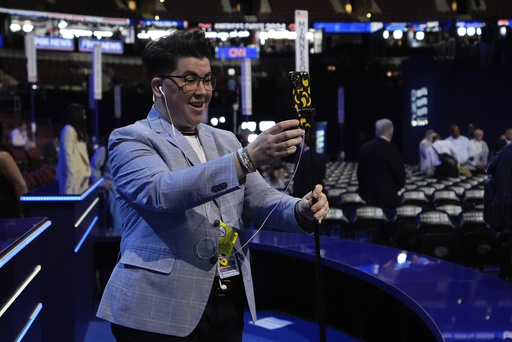During the week’s Democratic National Convention in Chicago, over 200 online influencers, streamers, and social media personalities have been actively documenting and live-streaming their experiences and thoughts on the event. These individuals include a diverse range of content creators, such as a 12-year-old known as “Knowa” who interacted with prominent Democrats and engaged with Republican figures like MyPillow founder Mike Lindell at the convention site.
A TikTok star from rural North Carolina, with a substantial following of over 5 million users, proudly declared himself a “Hillbilly for Harris.” These influencers are utilizing various platforms like TikTok, Instagram, Discord, and Twitch to share a wide array of content, from food truck offerings outside the United Center to discussions on significant issues like the conflict in Gaza.
Invited by convention organizers, these creators form a key component of the DNC’s digital strategy aimed at tapping into their large audiences to help Democratic presidential nominee Kamala Harris and her running mate Tim Walz connect with new voters who may not follow traditional media outlets for political news.
The creators present at the DNC come from diverse backgrounds and age groups, reflecting the diversity of their followers. They can be seen throughout the United Center, equipped with tripods and selfie sticks, capturing moments and sharing insights. The DNC has provided amenities such as “Creators for Kamala” lounges offering refreshments and dedicated working areas. Within the convention hall, there’s a designated Creator Platform for creators to create and share content.
Several creators have shared their surreal experiences of being surrounded by politicians and fellow content creators at the convention. Content ranges from light-hearted coverage like daily convention outfit checks to more insightful pieces uncovering the convention process and delegates’ responsibilities.
In addition to creating and sharing content on their platforms, these influencers are integrated into the convention program, with nightly appearances by creators like Carlos Eduardo Espina, who advocates for social justice issues to his vast audience. Despite critics questioning the DNC’s inclusivity of influencers and suggesting paid endorsements, convention spokesman Matt Hill clarified that content creators are not compensated or given special treatment.
The DNC’s decision to involve influencers aims to broaden the party’s outreach to new voter demographics, although it comes with potential risks due to the differing standards between content creators and traditional media outlets. However, by embracing a range of voices and channels for political engagement, the DNC hopes to engage with audiences who may not typically follow mainstream news sources.
As the landscape of media consumption evolves, and individuals turn to smaller, engaged online communities for news and information, the presence of influencers at the DNC exemplifies a shift in political outreach strategies. This move by the Harris campaign signifies an effort to energize and connect with voters who may otherwise be disengaged from traditional media platforms.
